

|
Back to |
| The Front Page |
| Archives |

|
U.S.C.A. headquarters complex
wins final county approval by Bob Alman design and image processing by Reuben Edwards Posted July 3, 1999 |
|
||||||
Chuck Steuber, president of the Croquet Foundation of America, has invested a year of solid groundwork and a substantial sum of his own money to bring to life his personal vision of the USCA headquarters of the future - the immediate future, if the donors he seeks are equal to the challenge. Creation of the 12-court complex in West Palm Beach would be, by far, the most significant development in American croquet since Jack Osborn hammered out an agreement between the original five clubs in 1977 to form the United States Croquet Association.
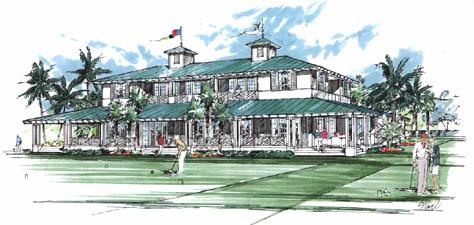 Twelve full sized courts flank the headquarters building on three sides.
Twelve full sized courts flank the headquarters building on three sides.
Having passed all the tests of the county's zoning board in early June, an ambitious proposal for building of a national headquarters for croquet in West Palm Beach surrounded by 12 croquet courts passed the last major hurdle - final and unanimous approval by West Palm Beach County commissioners - on June 29.
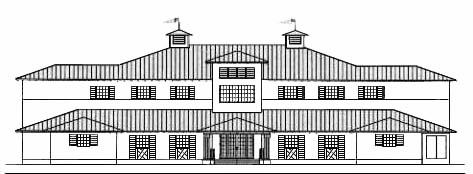 Broad covered patios or elevated porches overlook the courts on the back of the building and halfway along each side.
Broad covered patios or elevated porches overlook the courts on the back of the building and halfway along each side.
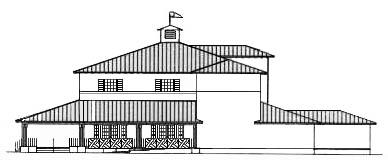 The ten-acre suburban development will include on-site parking for 100 cars and buffer zones to help make croquet a good neighbor in the relatively quiet suburban area. The headquarters building is planned to house the National Croquet Center headquarters staff, the Croquet Foundation of America, and a museum and trophy hall, in addition to a restaurant, bar, and croquet shop. The
enclosed building comprises 15,000 square feet, with another 4,000 square feet in covered porches and balconies.
The ten-acre suburban development will include on-site parking for 100 cars and buffer zones to help make croquet a good neighbor in the relatively quiet suburban area. The headquarters building is planned to house the National Croquet Center headquarters staff, the Croquet Foundation of America, and a museum and trophy hall, in addition to a restaurant, bar, and croquet shop. The
enclosed building comprises 15,000 square feet, with another 4,000 square feet in covered porches and balconies.
At the intersection of Summit Boulevard and Florida Mango Road, the project is in the midst of single-family homes and close to the towns of Lake Worth, Boynton Beach, and Delray Beach (a sitemap is available for viewing).
$2,000,000 gets the bulldozers started
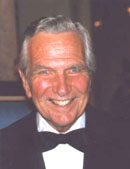
|
| Croquet Foundation of America president Chuck Steuber lives and plays croquet in both Greenwich, Connecticut, and Boca Raton, Florida. |
This is wholly Steuber's brainchild, and it was Steuber who purchased the land for $760,000 and guided the project through all the many levels of county approval. Establishing a permanent home for the USCA has been his primary focus as president of the Croquet Foundation of America, since he succeeded Ellery McClatchy in 1997.
Reflecting on the apparent stagnation in USCA growth in recent years, Steuber suggests both a cause and a remedy: "We are charged with the promotion of the sport in America," he said, "and for five years we have done nothing. We will continue to do nothing until we own our own courts. Four years ago, we were kicked out of PGA National, and this year, out of Palm Beach Polo, where we have a two-year reprieve."
The new home of the CFA and the USCA will replace Patrick's Corner Nursery, a family owned business dating from the 1930's. Before that, the site was part of a large cattle ranch in what was then rural Florida.
No survivor of the 30s would recognize the area today. There's not a cow in sight, and no alligators, either. Just a few blocks west of the croquet headquarters site is Donald Trumps' $40 million International Golf Club, nearing completion. Trump calls it "the best golf course in Florida," with memberships going for $150,000 and more. The Trump project has pumped up real estate values throughout the area.
In seeking to gain approval for the croquet project, there have been few public relations glitches, and all appear to have been corrected. One came from a misquote in the Palm Beach Post that had Steuber saying that "1,000 students a week" would be taking croquet lessons on the 12 courts. (If only!) What Steuber really said was "1,000 to 2,000 students a year" - hardly a traffic problem.
In fact, the adjacent Lake Patrick Property Owner's Association, representing 65 homeowners, unanimously endorsed the croquet development as an ideal low-density enhancement to the area.
Small changes continue to be made in the detailed architectural plans. Steuber himself expanded the width of the first floor porch overlooking what would probably be the main "finals" court from 12 feet to 19 feet. "It's the most important part of the building," Steuber explained, prime viewing gallery for major events, and ideal shelter from subtropical afternoon showers. Major donors would undoubtedly have a voice in the final design of the multipurpose building.
A sports headquarters without precedent in the croquet world
The closest foreign comparison to Steuber's vision for the national home of croquet is England's Hurlingham, where the English Croquet Association rents the office it has occupied since 1959. Hurlingham is, most of all, a social club with many activities in addition to croquet. There are six lawns dedicated to croquet, and four others can be adapted from the cricket pitch to make a total of 10. Many of the most prestigious croquet events in Britain - including the British Open in July - are played here. But if Hurlingham is known as Britain's "croquet capital," it carries that distinction mostly in the minds of croquet players, not in the public consciousness.
The other major croquet playing countries - Australia, New Zealand, South Africa, Egypt - are even further from the mark. Australia comes closest, but the croquet in Australia is organized around the state organizations (not the national one), and though there are more croquet lawns and clubs in Australia than in any other country, there is no one dominant center with which the sport is identified.
Creation of the 12-court complex in West Palm Beach would be, by far, the most significant development in American croquet history since Jack Osborn hammered out an agreement between the original five clubs in 1977 to form the United States Croquet Association. It would signal croquet's arrival as a serious sport; it would provide a strong focus for schools and instruction, for major events, for marketing, sponsorships, and publicity...for everything necessary to grow the sport. The most important international events - such as the MacRobertson Shield international test matches of 2004 - could be played on half the courts of the facility while club and instructional events continue unimpeded on the remaining six courts.
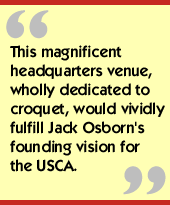
The new USCA headquarters would be for croquet what Aspen is for skiing - but even moreso, as this complex has no peer throughout the croquet world. This magnificent headquarters venue, wholly dedicated to croquet, would position the United States more powerfully as a dominant force in the sport, vividly fulfilling Jack Osborn's founding vision for the USCA.
It's easy to see why Steuber would pick out this particular path as his unique contribution as CFA president; a secure and permanent USCA headquarters is obviously needed. It's harder to explain his audacity in putting his own credibility and personal finances on the line for a project that some have labeled in its scale "unrealistic" and "impractical." But he himself sees that depth of personal commitment as the key to making it happen.
Chuck Steuber has a track record in making things happen
Steuber has impressive credentials as a self-made millionaire, entrepreneur, and dealmaker. Educated as a chemical engineer at the University of Wisconsin, his native state, he spent many years overseas as the European sales manager for Union Carbide's chemicals and plastics. Forming his own company in 1951, he pioneered the bulk shipping of chemicals in tankers similar to vessels used by oil companies. Operating up to four tankers at once, his marketing company had offices is 18 major cities and bulk storage facilities in five different sites around the world. Accurately foreseeing difficult time ahead for his industry, he successfully liquidated the company in the mid eighties, embraced retirement, and took up croquet.
An active player and officer in both croquet clubs near his homes in Greenwich, Connecticut, and Boca Raton, Florida, Steuber ran the croquet program at the Royal Palm Yacht and Country Club for five years in the early nineties. He has won the USCA Masters Championship four times. He and his wife have three grown children and two grandchildren.
Donors cannot lose their investment
Stueber has invested $45,000 of his own money in this project (as a donation to the CFA). Even he will not guess how far down this road he is willing to go, but on one point he is emphatic: no one risks their money in this project except him. He has personally guaranteed the CFA against any loss on the purchase of the land. If the contributions aren't sufficient to mount the croquet headquarters project, the donors stand to gain, in fact, an attractive return on the resale of a prime parcel of land that is a long way from the mythic financial swamp of Florida real estate. The property is just down the road from the Trump casino, and close (but not TOO close) to Palm Beach International Airport. If the USCA cannot grasp this opportunity for itself, some other organization will do it, and the property can be sold for a profit.
If Steuber commits part of his personal fortune to this project, he would not be alone among CFA presidents, including the most recent ones, Ellery McClatchy and Don Degnan. McClatchy has personally financed many education and marketing projects; he led the initiative to provide development funding for the USCA Website, CroquetAmerica.com; he and Degnan have pledged a bequest of $100,000 each to the Foundation.
The bulk of CFA funding in the past has gone to help pay the costs of the USCA headquarters staff and to subsidize publication of the ANNUAL and other expensive print projects. Carl Mabee's book on court building and maintenance was financed by the CFA, as well as the first official USCA rulebook and the "Bob and Ted" series of educational videos.
Perhaps the largest single fundraising commitment of the CFA in the past was for the establishment and maintenance of the National Croquet Gallery, Hall of Fame & Archives in a magnificently restored room at the Newport Art Museum in Rhode Island.
Adding up the bucks and the benefits
Each of the CFA's past projects pales in comparison with Stueber's vision for the new national headquarters. Nevertheless, he is confident that once potential donors see the plans and can envision what a difference this will make in establishing the sport in America and in assuring the USCA's leadership position in croquet, they will come forward with major bucks. To make it easier, a menu of donation options spells out exactly which portions of the project will be prominently dedicated in perpetuity to those donors.
- For $2,500,000, you get to name the entire complex.
- For $1,500,000, your name goes on the Headquarters Building.
- For $200,000, you become the founding patron of the Museum.
Are we getting warm yet?
Then consider one of these for a handsome tax exemption:
- Courts (12) - $100,000 each
- Dining Room - $100,000
- Club Lounge - $100,000
- Office - $100,000
- Trophy Hall - $100,000
- Meeting Room - $100,000
- Bar - $75,000
Having a bad year?
Here's your last bid for croquet immortality:
- South Patio - $50,000
- South East Patio - $50,000
- North East Patio - $50,000
- North Patio - $50,000
- Croquet Shop - $50,000
- Ladies Lounge - $50,000
- Mens Lounge - $50,000
- Museum Balcony - $50,000
As everyone knows, croquet players represent a relatively affluent sports demographic. Wealthy croquet players are responsible for establishing the sport in the first place. Without their patronage, Jack Osborn's USCA would never have survived. Numerous wealthy retirees are now presented with the ideal opportunity to invest effectively in the future of their favorite sport, and to see the tangible result within a short time. This is no "vanity" project, and Stueber is no starry-eyed visionary: It really can be done, and the building can commence this year. Steuber has bought the land, pushed through the approvals, and at considerable personal expense brought to life a compelling vision of the National Croquet Center headquarters of the future. What happens next is up to the potential donors.
[Tax deductable donations in any amount will be gratefully accepted by the Croquet Foundation of America, and a permanent record of donors' generosity maintained. Send your check payable to the CFA to USCA headquarters in Wellington, Florida, or contact Chuck Steuber by e-mail at: CroquetNut@aol.com
Donors of all amounts of $ 1,000 or more will be listed on a bronze plaque that will be displayed in perpetuity. Donors of items on the Underwriters List will have their own plaque perpetually displayed. Annual donations are not being requested. People who love the sport of croquet are being asked for this once-in-a-lifetime gift.]